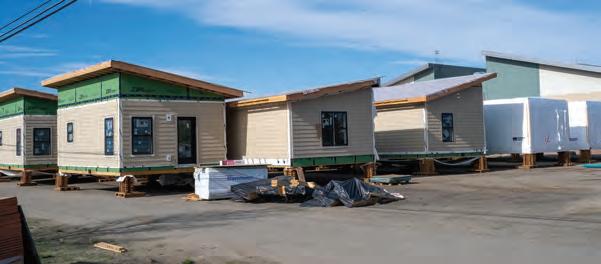
2 minute read
County signals support for AMI bill CONGRATS GUNNISON HIGHSCHOOL CLASSOF2023!
Bestwishesonyourfutureendeavorsand adventures!Thankyoustudents,teachers, andfamiliesforanothergreatschoolyear.
Legislation could help corral federal funding for affordable housing
Abby Harrison Times Staff Writer
Congress may take a stab at affordable housing in resort towns this year, with the coming introduction of a bill by Colorado Rep. Joe Neguse. The bill, tagged the Affordability & Fairness for Mountain Communities Act of 2023, has not yet been introduced to federal legislators, but is meant to help resort communities garner federal funding for affordable housing projects by offering hyper-local area median income (AMI) calculations.
This week, Gunnison County Commissioners directed County Manager Matthew Birnie to draft a letter of support for the bill, at the request of the Colorado Association of Ski Towns (CAST).
AMI is a familiar acronym in the valley, heard in the halls of every major affordable housing development in town. It is a metric used primarily to set standards for state and federally-funded affordable housing developments. As it stands now, AMI is calculated by the U.S. Department of Housing and Urban Development (HUD), which uses data from the U.S. Census-based American Community Survey to determine the limit for every geographic region in the country.
But in mountain resort towns, these federally-calculated numbers don’t always reflect the incomes of working community members, CAST Executive Director Margaret Bowes told the Times
“In mountain communities, some of our teachers are coming in at over 100%, and that’s where our needs are … our officers, teachers and nurses,” she said. “Because we have such high pay scales in the mountains, they are viewed at the federal level as being higher income earners.”
Inflated costs of living and higher wages in mountain and resort communities push those AMI ranges higher, disqualifying entire communities from federal support. This phenomena, now well-known as the “missing middle,” often leaves middleclass earners with dwindling purchasing power in a period of high inflation and limited housing supply. In Gunnison County, an individual in a one-person household would have to make between $30,000-40,000, or 50-60% AMI, to qualify for federally-subsidized housing, like Anthracite Place in Crested Butte or GardenWalk in Gunnison.
“There are resources for that [60% and below] need, like the LIHTC, [Low Income Housing Tax Credit Program], but it’s much harder to get funding for that missing middle,” Birnie said.
The bill would establish a waiver program for mountain communities that allows AMI calculations to be localized by zip code — in theory, producing more accurate income data to better serve that missing middle through opportunities for federal money.
“I'm actually thrilled to see when someone tries to create a more nuanced tool than the blunt instrument of AMI,” said County Commissioner Laura Puckett Daniels.
The waiver program would also look more closely at factors like how factoring roommates into AMI calculations would impact housing assistance. Text in the bill also suggests that AMI could be restricted or eliminated to make housing more affordable for low-income and seasonal workers.
The bill would also require HUD to produce a report after two years that summarizes the program’s progress. That report would include an assessment of the affordable housing crisis in mountain communities, especially in jurisdictions where a high housing cost adjustment has been applied. That’s an adjustment the federal government can use to increase income limits for areas where the cost of housing is abnormally high.
Once introduced, the bill will face debate from a split congress, and if it passes, HUD will codify the program as the Area Median Income Localization and have two years to produce the study for review by congressional committees.
“We have long known that AMI does not reflect the income of our local households very accurately [The bill] could really open the door to mountain communities being able to take advantage of more federal funding,” Bowes said.
(Abby Harrison can be contacted at 970.641.1414 or abby@gunnisontimes.com.)










